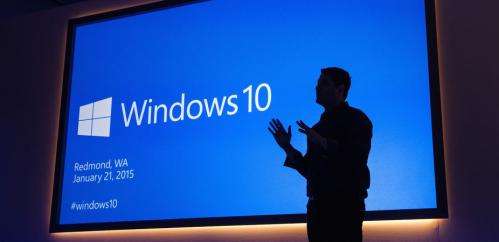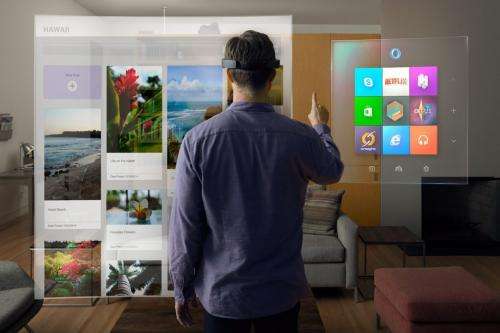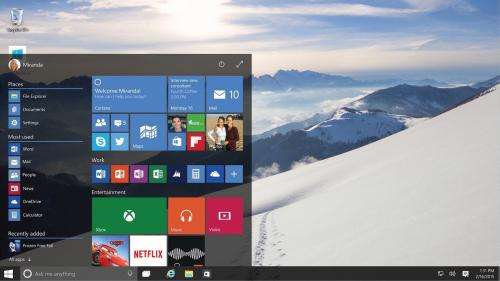Could Windows 10 be a winner for Microsoft?

The hype around the next generation of Windows reached a new high this week with the Windows 10 Preview, held at Microsoft's Redmond HQ in the US.
With the marketing machine revving at the red-line, the event has settled much of the speculation about this latest version of Windows. No firm release date has been announced, but could be anytime after the Technical Preview ends on April 15 this year.
Windows 10 will be free to download for at least a year for existing users of Windows 7 and 8.1.
What happened to Windows 9?
If Windows 8.1 is the current version, why are we not talking about Windows 9? According to Tony Prophet, Microsoft's VP of Windows marketing it simply "came and it went". A case of blink and you missed it.
Skipping a version number creates the perception that Windows 10 is a radical, not just an incremental improvement on Windows 7 and 8.1, according to Prophet:
We're trying to create one platform, one eco-system that unites as many of the devices from the small embedded Internet of Things, through tablets, through phones, through PCs and, ultimately, into the Xbox.
What's new in Windows 10?
Avid Microsoft watcher Mary Jo Foley reports that Windows 10 is based on a common "core" of software that allows it to operate across the range of Microsoft devices.
The core is the foundation of a computing environment, or "eco-system" that is open enough to allow Microsoft to introduce new hardware and software elements to its product range in future versions of Windows.
Here are some of the features we can expect in Windows 10:
Continuum allows a user to shift easily between desktop and tablet modes. Not being able to do this was a major bug-bear for Windows 8 users. So for example, when a Surface Pro user detaches the screen, a pop-up asks if they would like to Enter Tablet mode. When the screen is replaced, the user can Exit Tablet mode.
Windows Holographic is a suite of Augmented Reality (AR) applications that run on a powerful, standalone computer housed in a set of AR glasses called HoloLens. These glasses use tinted lenses that allow holographic images to be over-laid on the physical world. The realistic effect is enhanced by 3D audio and advanced sensors. Working independently of a PC, the unit can be controlled using hand movements, vision and voice commands.
Universal Apps is a common suite of applications that operate across all device types, from desktop to smart-phone. The apps, which include the Office suite, use Microsoft's cloud-based OneDrive for ubiquitous storage of documents, spreadsheets, powerpoint presentations, mail, photos, videos, maps, messaging and calendar.
Cortana is Microsoft's version of Apple's Siri that some readers will know from the game Halo. Already something of a hit on the Windows phone, Cortana on Windows 10 is a pleasant-sounding, natural language virtual assistant that can perform tasks and answer questions by searching on your local computer, cloud account and the internet using Bing. Cortana will be integrated into the new Spartan browser (see next item) where text-based enquiries can be entered.
Internet Explorer replaced with Spartan. IE will be replaced by a stripped-down browser called Spartan (another reference to Halo). Users will probably notice some similarities with Chrome and Firefox. IE will continue to ship with Windows for a time to ensure that some enterprise applications that are designed to work with IE continue to work as they should.

Surface Hub is an wirelessly-connected high definition 84-inch virtual whiteboard. Equipped with advanced sensors, pen input support, cameras and microphones, Surface Hub allows brainstorming teams (virtual or co-located) to create text and 3D drawings that can be manipulated and shared.
Xbox integration with Windows 10 becomes possible with a new application that allows games being played on Xbox One to be streamed live to the linked computer. The Xbox app also allows people to record games they are playing on their PC and feed this into Xbox LIVE for a social experience.
The Start menu, once removed from Windows 8, will be restored to its rightful place in Windows 10. The new Start menu will be more customisable than the old, with a space for your favourite apps, programs and websites.

Will Windows 10 succeed?
To succeed in today's tech world, a computer system must be intuitive and well-adapted to people's needs – enjoyable to use. Not only that, the system should be defect-free and affordable if a discerning user-base is to be kept happy and coming back for more.
From this week's Preview, Windows 10 looks like it might meet these stringent requirements. With an extended technical review period that has solicited feedback from millions of participating users, Microsoft has put in the hard-yards to know what it is that people want and have made the effort to give it to them.
But Windows 10 will need to be good if people are to upgrade from still popular legacy products. Windows XP and 7 currently account for around 74% of PC operating systems globally, while the later, supposedly improved Windows 8.x has languished at around 13%.
Will I be jumping in to upgrade my own computer to Windows 10? Maybe, but based on past experience, I think I will wait and see.
Source: The Conversation
This story is published courtesy of The Conversation (under Creative Commons-Attribution/No derivatives).




















